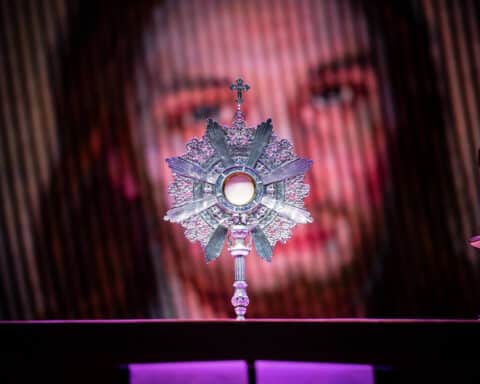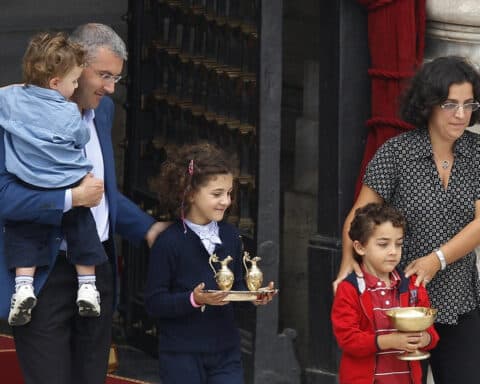Question: Our new pastor has begun to have music at all the Masses. We have attended 7:30 a.m. Mass for 40 years and very seldom had music even though we did sing entrance and exit songs from time to time. When I asked about why we are now playing the organ at this Mass, his reply was that it is a “rule” of the Church and since there is someone who can now do this, he is implementing the singing and playing of the organ.
Also, is it permissible to play hymns from a phone over the speakers in the church during adoration? I would appreciate hearing your response to these questions.
— Vince Tallo, via email
Answer: Perhaps your pastor’s use of the word “rule” may be a bit too strong. There are, however, norms that favor singing at Masses, with some exceptions. This is especially true of Sunday Masses and solemn feasts. The General Instruction of the Roman Missal (GIRM) has this to say: “The Christian faithful who gather together as one to await the Lord’s coming are instructed by the Apostle Paul to sing together psalms, hymns, and spiritual songs (cf. Col 3:16). Singing is the sign of the heart’s joy (cf. Acts 2:46). Thus St. Augustine says rightly, ‘Singing is for one who loves.’ There is also the ancient proverb: ‘One who sings well prays twice.'”
It continues: “Great importance should therefore be attached to the use of singing in the celebration of the Mass, with due consideration for the culture of the people and abilities of each liturgical assembly. Although it is not always necessary (e.g., in weekday Masses) to sing all the texts that are of themselves meant to be sung, every care should be taken that singing by the ministers and the people is not absent in celebrations that occur on Sundays and on holy days of obligation.”
This is likely the norm to which your pastor refers. Note however that, as a norm and not a strict law, there is some provision for the culture and the abilities of the congregation. And while singing is not always necessary, efforts should be made for some music at Sunday Masses.
All that said, many parishes do reserve one Sunday Mass (often the earliest one) for a quieter format. Some Catholics however, for many reasons, like a Mass without lots of singing or instruments. It is usually not that they dislike music, but that they prefer a quieter Mass. To be sure, many of our Masses today are busy affairs with many requests for attention, signing, page turning in hymnals, announcements, etc. I once asked a group of young adults why they liked the traditional Latin Mass and was surprised by their answer. It wasn’t about old vs. new, and Vatican II wasn’t even on their radar. They said they liked it because it was quieter and more focused. It was almost like going to adoration. And while liturgists may quibble with this sort of answer, we do well to listen and ponder this sort of answer. Some of the faithful, who spend all week in a loud and disruptive world where they are harangued by constant requests, value quieter and less active Masses. Some, not all, find many liturgies loud and busy, leaving less time for prayer and reflection. There are others who appreciate sung Masses with traditional or contemporary music and some level of exuberance. In most parishes, it is possible to accommodate this sort of variety.
So, your pastor is not wrong, and you do well to listen to his concerns, pondering if your concerns are reflective of a large number or just what a few prefer at your parish. Pastors have to consider what level of diversity is appropriate and possible within Church norms, and how best to serve the needs of their faithful. This matter is something known as a “prudential judgment.” That is, the norm, while declaring a preference, has provisions that allow leeway. Continue to discuss the matter with him and balance your personal preference with a reminder we all need, namely, that communal worship is not private worship.
As for recorded music during adoration, it is not ideal. However, there can be reasons it should be allowed, especially during long periods of ongoing adoration. On some occasions, it is necessary to cancel out noise from the outside such as traffic, sirens, school playgrounds, etc. There may also be security reasons, since music playing in the background gives the impression that others are around.





